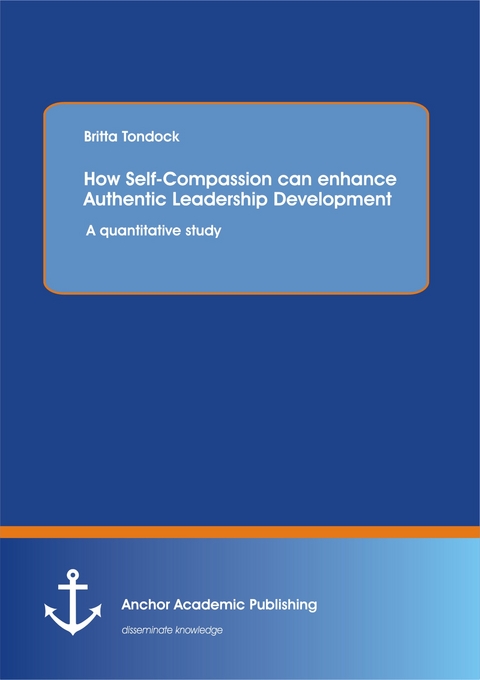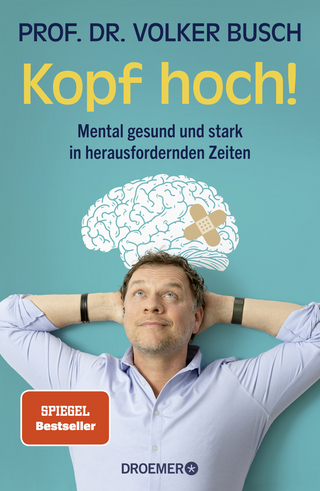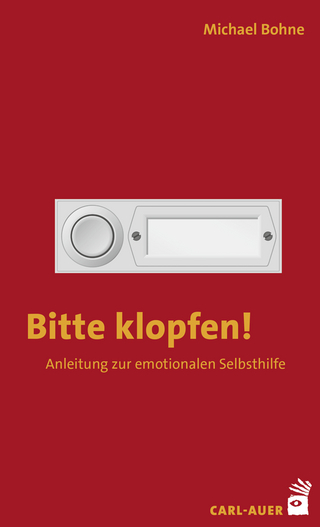
How Self-Compassion can enhance Authentic Leadership Development: A quantitative study
Anchor Academic Publishing (Verlag)
978-3-95489-379-9 (ISBN)
Britta Tondock, M.Sc., was born in 1985 in Northeim, Germany. After finishing her apprenticeship as a banking specialist, she graduated in Business Psychology at the Leuphana University Lüneburg in 2011. After doing a half-year internship in an educational institution in Brazil, she she finished her Master’s degree in Business Psychology at the Westminster University in London with distinction. Throughout her studies, she collected valuable practical experience in conducting teambuildings, Train-the-Trainer-seminars and leadership development courses for members of an international student organisation. Her high interest in personal growth and it’s value for organizational development brought her to conduct this study.
Text Sample:Chapter 2. Study design:Chapter 2.1. Quantitative design:Given the fact that validated quantitative measurements for both constructs already exist, it seemed logical to use those existing questionnaires for a first exploration of the field, therefore choosing a quantitative study design. Based on the review of the literature, we assume that a high level of Self-Compassion would result in a high level of a leader's authenticity. Therefore, the hypothesis we want to maintain is the following (H1):H1: There is a positive correlation between a leader's level of Self-Compassion (SC) and his level of authenticity (AL).Accordingly, the hypothesis we would like to falsify is the following (H0):H0: There is no correlation between a leader's level of Self-Compassion (SC) and his level of authenticity (AL).As we are making both a prediction about the presence of a significant effect and the direction of this effect, our hypothesis is one-tailed (Brace et al., 2006). Considering the direction of our research question, Self-Compassion would be the independent, Authentic Leadership the dependent variable.Chapter 2.2. Population: the international student organization 'AIESEC':The population for this sample consists of young students and professionals involved with the international student organization 'AIESEC'. AIESEC is an independent, non-political, non-for-profit organization run by students and graduates of higher education. The organization is delivering leadership activities as well as international internship experiences for 86.000 members in 124 countries, and has been doing so for more than 60 years (see AIESEC website, 2013a). Participants got approached via the professional online communities 'LinkedIn' and 'XING Germany', as members of the organization are present in large numbers and organized in succinct groups on both platforms. Both active members and Alumni were considered (for a detailed overview about the approached groups, see IV.2. in appendices). The online questionnaire was designed using the survey software Qualtrics. It got posted weekly over a timely period of seven weeks.Chapter 2.3. Measurements:The two variables Authentic Leadership and Self-Compassion got operationalized using existing sub-scales and measured with two existing questionnaires. For this study, the two questionnaires got combined. The final measurement therefore consisted of 42 items and 9 demographic questions being answered via self-rating of the participants (for a detailed version of the questionnaire, see IV.3. in appendices). The structure of the used measurements shall be described in the following.Chapter 2.3.1. Authentic Leadership Questionnaire (ALQ):The construct Authentic Leadership (AL) got measured with the Authentic Leadership Questionnaire (ALQ) developed by Walumbwa et al (2008). It is a theory-driven leadership survey designed to measure the four components that have been conceptualized as defining Authentic Leadership, namely Self Awareness, Transparency, Ethical/Moral and Balanced Processing. The original questionnaire includes a self-rating and an external rating by peers, whereas in this study only the self-rating part was used. It consists of 16 items, for example 'As a leader I say exactly what I mean' (Transparency), 'I demonstrate beliefs that are consistent with actions' (Ethical/Moral), or 'I seek feedback to improve interactions with others' (Self-Awareness), rated on a Likert Scale from 1 (Not at all) to 5 (Frequently, if not always). Copyright for this questionnaire is held by Avolio, Gardner & Walumbwa (2007), and permission to use the questionnaire for this study has been granted (delivered by Mind Garden, see IV.3.3. in appendices).Chapter 2.3.2. Self-Compassion Scale (SCS):Following the 16 items of the ALQ, the questionnaire continued with 26 self-rated items measuring the construct Self-Compassion, taken in ist original form following the Self-Compassion Scale developed
| Sprache | englisch |
|---|---|
| Maße | 155 x 220 mm |
| Gewicht | 147 g |
| Einbandart | Paperback |
| Themenwelt | Sachbuch/Ratgeber ► Gesundheit / Leben / Psychologie ► Psychologie |
| Geisteswissenschaften ► Psychologie ► Arbeits- und Organisationspsychologie | |
| Wirtschaft ► Betriebswirtschaft / Management ► Unternehmensführung / Management | |
| Schlagworte | leadership development • leadershipment • Self-Compassion |
| ISBN-10 | 3-95489-379-7 / 3954893797 |
| ISBN-13 | 978-3-95489-379-9 / 9783954893799 |
| Zustand | Neuware |
| Haben Sie eine Frage zum Produkt? |
aus dem Bereich


